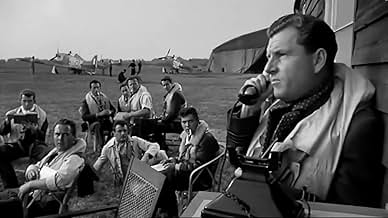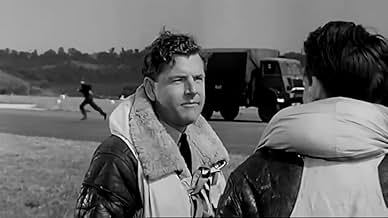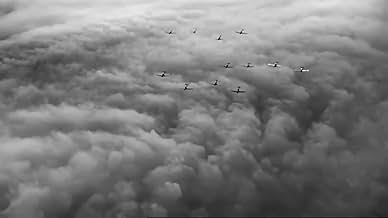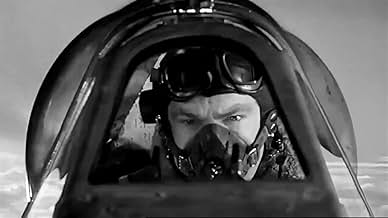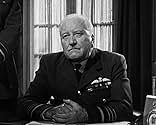NOTE IMDb
7,2/10
3,1 k
MA NOTE
Ajouter une intrigue dans votre langueBiopic of RAF Group Captain Douglas Bader who, after having lost both legs, flew a British fighter plane during WWII.Biopic of RAF Group Captain Douglas Bader who, after having lost both legs, flew a British fighter plane during WWII.Biopic of RAF Group Captain Douglas Bader who, after having lost both legs, flew a British fighter plane during WWII.
- Réalisation
- Scénario
- Casting principal
- Victoire aux 1 BAFTA Award
- 1 victoire et 4 nominations au total
Howard Marion-Crawford
- 'Woody' Woodhall
- (as Howard Marion Crawford)
Avis à la une
Douglas Bader (1910-1982) was one of Britain's most popular heroes of WWII, a celebrated combat pilot and Flight Commander. His triumphs during the Battle of Britain proved significant in the Allied victory. In 1941, after he was taken prison in German-occupied France, Bader caused headaches for the enemy with repeated escape attempts, and he was eventually confined to Colditz Castle, a prisoner-of-war camp reserved for such trouble-cases. And did I mention that he did all these things without the use of his legs? On December 14, 1931, Douglas Bader had crashed his aeroplane while attempting low-altitude maneuvers, sustaining such injuries that doctors were forced to amputate both legs. The characteristically resilient pilot later understated the gravity of his disaster with this laconic note in his logbook: "Crashed slow-rolling near ground. Bad show." Following the success of Paul Brickhill's biography, British director Lewis Gilbert (most noted for later directing several James Bond films) brought Bader's story to life, an inspirational testament to a man for whom "impossible" was not a word.
The natural comparison for 'Reach for the Sky (1956)' is Wyler's 'The Best Years of Our Lives (1946),' which starred a real-life war veteran (Harold Russell) who had lost both arms in combat. There are biographical distinctions, of course – Bader lost his limbs in peace- time, and later fought while "disabled" – but the basic theme of overcoming one's handicaps through hope and determination holds firm. Kenneth More {whom I recently discovered in the gripping Titanic docu- drama 'A Night to Remember (1958)'} brings a likable cockiness and fierce determination to the leading role. Bader's dogged resolve at times seems terse and even stubborn; his notion of success appears to hinge upon rejecting the helping hands of friends and loved ones. In his attitudes, there is a certain conceitedness, perhaps a necessary attribute for a pilot who rose to the military rank of Group Captain. More's portrayal certainly imparts these elements of vanity, but one can't help but be inspired by a man whose never-say-die outlook knows no bounds.
Muriel Pavlow plays Bader's wife, Thelma, a delicate woman who seems unfairly neglected while her husband chases his ambitions. Though given substantially less screen-time, the film's most interesting female character, I thought, was Dorothy Alison's nurse, who tends Bader back to health following his accident. Her appearance is brief, but incredibly subtle: just watch the series of conflicting emotions flicker across her face as Bader departs, love and sadness and everything in between. I had expected the nurse to make an appearance later in the film, but she appears to have been shunned permanently from Bader's life. This ties in nicely with the leading character: after resolving himself to be entirely self-sufficient, he must reject the one woman on whom he once relied so heavily. In Wyler's film, Russell's character accepts that he'll never be entirely independent, and it's only fitting that he should marry a woman who'll always be there to offer a helping hand. Bader rejects this helping hand; he's not much of a husband, but he is one hell of a battler.
The natural comparison for 'Reach for the Sky (1956)' is Wyler's 'The Best Years of Our Lives (1946),' which starred a real-life war veteran (Harold Russell) who had lost both arms in combat. There are biographical distinctions, of course – Bader lost his limbs in peace- time, and later fought while "disabled" – but the basic theme of overcoming one's handicaps through hope and determination holds firm. Kenneth More {whom I recently discovered in the gripping Titanic docu- drama 'A Night to Remember (1958)'} brings a likable cockiness and fierce determination to the leading role. Bader's dogged resolve at times seems terse and even stubborn; his notion of success appears to hinge upon rejecting the helping hands of friends and loved ones. In his attitudes, there is a certain conceitedness, perhaps a necessary attribute for a pilot who rose to the military rank of Group Captain. More's portrayal certainly imparts these elements of vanity, but one can't help but be inspired by a man whose never-say-die outlook knows no bounds.
Muriel Pavlow plays Bader's wife, Thelma, a delicate woman who seems unfairly neglected while her husband chases his ambitions. Though given substantially less screen-time, the film's most interesting female character, I thought, was Dorothy Alison's nurse, who tends Bader back to health following his accident. Her appearance is brief, but incredibly subtle: just watch the series of conflicting emotions flicker across her face as Bader departs, love and sadness and everything in between. I had expected the nurse to make an appearance later in the film, but she appears to have been shunned permanently from Bader's life. This ties in nicely with the leading character: after resolving himself to be entirely self-sufficient, he must reject the one woman on whom he once relied so heavily. In Wyler's film, Russell's character accepts that he'll never be entirely independent, and it's only fitting that he should marry a woman who'll always be there to offer a helping hand. Bader rejects this helping hand; he's not much of a husband, but he is one hell of a battler.
'The channels are blocked? Then we'll ruddy well UNblock 'em!' This is the point in the film where I feel like cheering, as it perfectly sums up Bader's 'can do, will do' approach. It's the true story of Douglas Bader, a young flying enthusiast who went on to be a fearless WW2 Spitfire pilot, losing both legs in the process. His struggle to walk again, his courting of a pretty girl and his later formation of 'the big wing' in the fight against the Nazi invasion are laid out here with gusto, verve and a little humour. Kenneth More is excellent as Bader, using his natural, relaxed acting technique to give the part a free-wheeling energy. The very pretty Muriel Pavlow plays his wife who grows increasingly concerned at his derring-do, and there is a solid cast of British regulars of the time. The music is stirring, the direction brisk and the story itself is straight out of a Boys' Own comic. What more could you ask for? A perfect Sunday afternoon film.
What do you mean, you haven't seen this film? A classic World War 2 RAF adventure film depicting the true British spirit of one man's (Douglas Bader) fight to overcome the loss of both legs in a flying accident, to become a Wing Commander in the Battle of Britain. Lewis Gilbert keeps the film crackling along at a fast pace with Kenneth More, at the peak of his form, delivering the goods with a first rate supporting cast - don't miss it.
After losing both his legs in a flying accident, Douglas Bader not only mastered the use of his artificial legs, he also astounded everybody by flying for the RAF again-leading the assault in the Battle Of Britain in the process.
Reach For The Sky opens up with a disclaimer of sorts, the usual yadda yadda about certain events in Bader's life being altered in the name of entertainment. To which it should be mentioned that for a honest look at the man and his life, those interested should either read the biography that this is adapted from {written by Paul Brickhill), or source from many other available means. That said, Lewis Gilbert's film is in essence a true story. Yes it is true that some of Bader's known character traits are not fully formed, and yes the makers here were very clever in casting the hugely popular Kenneth More as Bader to ensure the film stayed away from Bader negativity. But it stands up as an uplifting film regardless of its supposed glorification of combat.
Kenneth More gives it the whole kitchen sink, so much so that pretty much everyone else in the picture barely gets a look in. But to do down More for that would be grossly unfair, asked to carry the narrative entirely, he not only achieves that, but he also makes Bader an inspiration for many, and that has to be a good thing. It caught me personally at the right time, a time when I was feeling rather sorry for myself, so with that in mind the film definitely achieved its aims. Thematically strong and technically sound, Reach For The Sky is a recommended picture, but not, if you aren't prepared for some artistic license as regards the "hero" of the piece. 7/10
Reach For The Sky opens up with a disclaimer of sorts, the usual yadda yadda about certain events in Bader's life being altered in the name of entertainment. To which it should be mentioned that for a honest look at the man and his life, those interested should either read the biography that this is adapted from {written by Paul Brickhill), or source from many other available means. That said, Lewis Gilbert's film is in essence a true story. Yes it is true that some of Bader's known character traits are not fully formed, and yes the makers here were very clever in casting the hugely popular Kenneth More as Bader to ensure the film stayed away from Bader negativity. But it stands up as an uplifting film regardless of its supposed glorification of combat.
Kenneth More gives it the whole kitchen sink, so much so that pretty much everyone else in the picture barely gets a look in. But to do down More for that would be grossly unfair, asked to carry the narrative entirely, he not only achieves that, but he also makes Bader an inspiration for many, and that has to be a good thing. It caught me personally at the right time, a time when I was feeling rather sorry for myself, so with that in mind the film definitely achieved its aims. Thematically strong and technically sound, Reach For The Sky is a recommended picture, but not, if you aren't prepared for some artistic license as regards the "hero" of the piece. 7/10
This may rate as one of the classic war films.
A (fairly) true to life film, about Douglas Bader, who it is reported was a fairly arrogant person, though highly driven.
Kenneth More in the lead role, delivers his usual top notch performance, and they rest of the cast just seem to fit together the way they should.
The film covers Baders life, and the loss of his legs in a flying accident that was in truth of his own making, and then how he puts his life back together afterwards.
It shows an amazing spirit and determination, to the extent that he got back into the RAF and became a successful pilot and air tactition.
This film should be watched by other people who have had the misfortune of an amputation, and i don't mean that in a condescending manner, Bader showed what you can do if you put your mind to it, he wouldn't let his disability beat him.
A really good movie, easily watched more than once, and good for more than one reason.
A (fairly) true to life film, about Douglas Bader, who it is reported was a fairly arrogant person, though highly driven.
Kenneth More in the lead role, delivers his usual top notch performance, and they rest of the cast just seem to fit together the way they should.
The film covers Baders life, and the loss of his legs in a flying accident that was in truth of his own making, and then how he puts his life back together afterwards.
It shows an amazing spirit and determination, to the extent that he got back into the RAF and became a successful pilot and air tactition.
This film should be watched by other people who have had the misfortune of an amputation, and i don't mean that in a condescending manner, Bader showed what you can do if you put your mind to it, he wouldn't let his disability beat him.
A really good movie, easily watched more than once, and good for more than one reason.
Le saviez-vous
- AnecdotesRichard Burton was the first choice for the lead but he dropped out after he was offered the lead in Alexandre le Grand (1956) at what Lewis Gilbert describes as "three or four times the salary".
- GaffesWhen Bader is demonstrating his ability to fly the Hurricane to his new squadron of Canadian pilots, there is a long cut of the plane flying upside-down in a straight line. This was impossible in the Hurricane, as it had a gravity-fed carburettor. If you look carefully at the clouds, and how the sunlight reflects from them, the image has clearly been inverted.
- Versions alternativesOriginally released in Great Britain at 135 minutes; cut by 12 minutes before the American premiere.
Meilleurs choix
Connectez-vous pour évaluer et suivre la liste de favoris afin de recevoir des recommandations personnalisées
- How long is Reach for the Sky?Alimenté par Alexa
Détails
- Date de sortie
- Pays d’origine
- Langues
- Aussi connu sous le nom de
- Reach for the Sky
- Lieux de tournage
- Sociétés de production
- Voir plus de crédits d'entreprise sur IMDbPro
Box-office
- Budget
- 380 000 £GB (estimé)
- Durée2 heures 15 minutes
- Couleur
- Rapport de forme
- 1.85 : 1
Contribuer à cette page
Suggérer une modification ou ajouter du contenu manquant

Lacune principale
By what name was Vainqueur du ciel (1956) officially released in India in English?
Répondre

